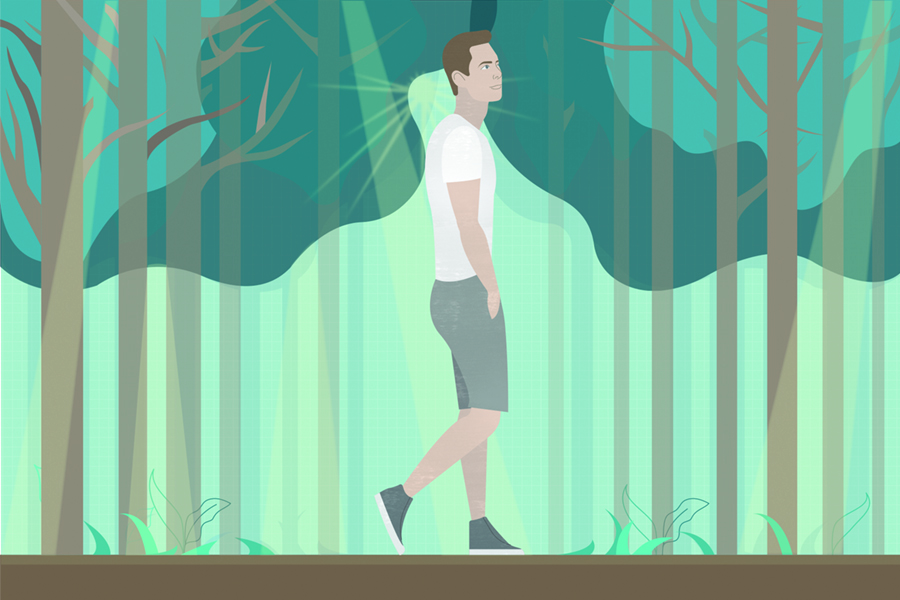This year, we’ve endured a confluence of crises — and as I write this, we’re barely halfway through 2020. Between the coronavirus pandemic, a mass economic downturn, and a global protest movement fueled by systematic bias and racism, it’s an understatement to say we’re “going through a lot.” These things may be affecting everyone in a different way, but they are affecting everybody profoundly. There’s no one who hasn’t been touched by the magnitude of what’s going on.
There’s a long road ahead, as these health, social, and economic crises are likely not going to be solved by the end of summer. There’s only one way for each of us to get through this in a physically and mentally healthy way — and that’s to make our own rest and recovery a priority.
This goes beyond just getting enough sleep. It’s about carving out space and time to be with our thoughts, and connect with a deeper part of ourselves. In fact, giving ourselves permission to slow down and get quiet, to hear our own wisdom, and tap into our own inner knowledge is important for showing up for ourselves and the world. From this place of stillness, we can get clarity on what actions we can take to feel better about our contributions to the world.
Simply put, prioritizing rest and recovery helps us show up at our best, in every circumstance. It gives us the strength to fight against unequal treatment, to care for ourselves and others, and to weather the pandemic and the changes to everyday life that have come with it. If you’ve already made rest a priority in your life, keep doing it — and spread the word to others. If you’re not, these ideas can help you get started.
Recognize the warning signs of exhaustion. Since the pandemic hit, many people have been living in a state of isolation, uncertainty, and confusion. Then layer on what’s going on in terms of racial injustice: To effect change, we need to turn our outrage into long-term action. Of course, all of this can create extreme emotional fatigue.
So how can you tell if you’re emotionally exhausted? If you’re getting enough sleep and still waking up tired, it’s a sign that you probably don’t need more sleep — you need more restoration and recovery breaks throughout the day. Irritability, inability to focus, a lack of energy — these are all signs that we need to restore ourselves.
Claim your right to rest. In general, our society doesn’t know how to rest, and we don’t give ourselves permission to rest. It may help you to see rest as essential to consider certain occupations where a lack of sleep could have very visible consequences. For an athlete, for example, rest days are just as important as training days — without recovery, the body would not be able to perform. Similarly, pilots, truck drivers, and doctors work a certain number of hours and are then forced to rest and take time off. We can easily see why we wouldn’t want an overtired surgeon to operate on us, but why can’t we see that rest is as essential for every one of us? In Western society, many believe getting by on little sleep earns us bragging rights. When in reality, our effectiveness and resilience in the world — especially during tough times — demands that we view sleep as a non-negotiable.
When you’re rested, you are more creative, productive, and able to solve complex problems. You show up energized and at your best, giving your full attention and engagement to whatever you’re doing. This is especially important when you’re engaging in something that brings out high or difficult emotions. You need that extra energy so that you can give of yourself in a way that is meaningful.
Truly disconnect. In order to feel connected to others, we have to feel connected to ourselves first. Taking a break from others to connect with ourselves helps us recharge so we can truly serve the cause that we want to serve, and be present with the people we care about.
“Disconnecting” looks different for everybody, but one of my favorite ways to unplug is to go for a walk in nature or for a hike. Yes, you’re physically moving your body, but you’re resting and rejuvenating and connecting with the earth and yourself. In a soul sense, that is restful and recharging. That said, there are other ways to disconnect that don’t require a lot of time. You might simply set aside a few minutes each day just to sit and be. Meditation is one great way to do that; scrolling through social media, on the other hand, is not.
Focus your time. We all have the same 24 hours, and our energy is precious — we shouldn’t just let it spill out everywhere. Rest, recovery, and reflection help us get in touch with where we truly want to devote our time and energy.
Racial injustice is a huge issue. It’s systemic; it’s in every part of our society. Many of us are asking, “How do I even start to fight for change?” To start, we have to slow down and think about where we can invest more energy. That may require putting boundaries around other, less consequential aspects of our lives that get more of our attention than they need to.
I keep to-do lists, and I recently went back and revised my list, crossing off a whole bunch of to-dos that weren’t useful or relevant anymore. Revisit your list with a new lens, rethinking what matters to you, what you really want to take action on.
Follow us here and subscribe here for all the latest news on how you can keep Thriving.
Stay up to date or catch up on all our podcasts with Arianna Huffington here.


